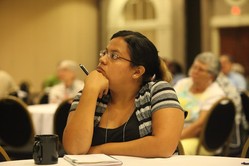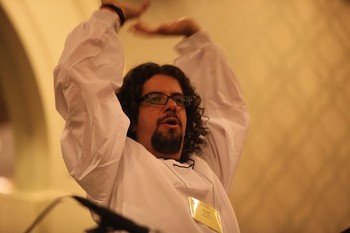Does it matter where you pray, or with whom you pray?
Yes it does, Claudio Carvalhes, a professor at Lutheran Theological Seminary in Philadelphia, told participants gathered under the Big Tent for the National Multicultural Conference and the Theology, Worship, and Education Conference here.
“I’m suggesting we should pray together in the midst of strangers,” he said. And if we pray with people of different cultures, he wondered, “How would this change our church?”
Big Tent, Aug. 1–3, is a celebration of Presbyterian Church (U.S.A.) mission and ministry organized around the theme “Putting God’s First Things First.” It’s composed of 10 national Presbyterian conferences, more than 160 workshops and special events to mark the 30th anniversary of the formation of the PC(USA) and the 25th anniversary of the opening of the Presbyterian Center here.

Susie Sanchez of Fort Worth, Texas, listens intently to the presentation on the importance of multicultural worship. —Danny Bolin
Carvalhaes’ address, “Praying the Faith in a Multicultural Context,” was the second in a three-part series on the theme of the Theology, Worship, and Education Conference: Thinking, Praying, Living the Faith.
Praying with people of different cultures “is an enormous challenge,” said Carvalhaes. “It’s painful. It’s a way of disrupting our own sense of safety.”
But following Christ wasn’t meant to be easy, he added. “If you go to church and leave saying, ‘Wasn’t that nice,’ I wonder if you really worshiped. Liturgy is always a call to conversion.”
Carvalhaes, who grew up in Brazil, told listeners, “Now that I’m here in the United States, my faith is so mixed up. Having a pure faith is not so important anymore.
“We’re called to be mixed up together,” he added. After all, “there has never been a pure gospel — that’s why we have four Gospels.”
The message people often get from today’s church is that they must believe correctly before they can pray, Carvalhaes said. “In the early church, they prayed first and theology came after that.”
Carvalhaes also posed the question: “Worship space — who owns it?” The answer? “God.” If our worship space belongs to God, he said, that means “worship space is foreign space. Nobody owns it.” In other words, we’re all foreigners there.
Carvalhaes pointed out that multiculturalism extends beyond race. Social media, for example, poses similar challenges to today’s church. For older generations, learning to use social media to communicate can be like engaging a different culture. It can be difficult and painful.
But taking the risk to reach out to these other cultures can also be full of blessing, he added. “I’ll be much better if I learn to pray your prayers and not only my own.”

